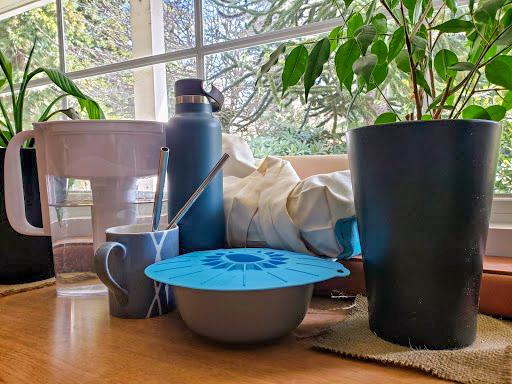Don’t reuse until you rethink your mindset

An assortment of reusable items and plants sit by a window.
Metal straws, Hydro Flasks, reusable bags, tumblers, and more. Purchasing items like these and carting them around to show everyone how “eco-friendly” you are has become common, particularly among young adults and teens. But the intention for purchases doesn’t always match what these products are supposed to be used for.
A reusable product should be bought to reduce plastic consumption, but this isn’t the case. Often, the products are bought due to their bandwagon appeal. Society has romanticized reusable products, sending people rushing to consume excessively without considering that they may waste more by doing this.
Picture this: your friend buys some metal straws, so you decide you need some as well. You hit up Amazon and find a great deal on a 20-pack of these straws (canvas carrying bag included!). They arrive in a box ten times larger than the product itself—but don’t worry, the mountain of bubble wrap inside will make up for how much you’ll use these straws. After extricating each straw from its individual plastic packaging, you put them in your new canvas bag.
The following afternoon, you pull out a straw, put it into your drink, and snap a few photos for the Insta: #reusereducerecycle, #ecofriendly, #savetheturtles. As the likes and congratulatory comments pour in, you feel accomplished for doing your part to help the planet. You wash your straw, put it back in the bag, and set it down. It remains there until the next convenient time to post comes. A week passes, and the straws became old news—you ordered a new Hydro Flask! The straws sit in a drawer, forgotten.
The sad reality is that the sole intent of many consumers is to wow others with their efforts to “save the planet” when they’re doing more damage than good. This is not everyone: many people consistently use their own reusable products and reduce their plastic use. But for most of the population, this is not the case.
There is nothing wrong with buying reusable products. When used often enough, they reduce one’s environmental impact. The problem is when people have flawed intentions and only use reusable products to show off. So before you buy a reusable item, think of why you want to buy it. And be sure to get as much use as you can out of these items before they give out.

Natalie Foote is a sophomore at Beaverton High School who writes articles for The Hummer and helps manage its social media platforms. She enjoys running...

Anouk is a senior who writes and edits articles, takes the occasional photo, and helps everything run in the background.











beavertonhigh • Apr 14, 2020 at 3:23 pm
Reblogged this on Beaver Tales and commented:
Via BeavertonHummer.com
LEARNING TRANSFORMS US.
#ExperienceBHS #ourBHSstory